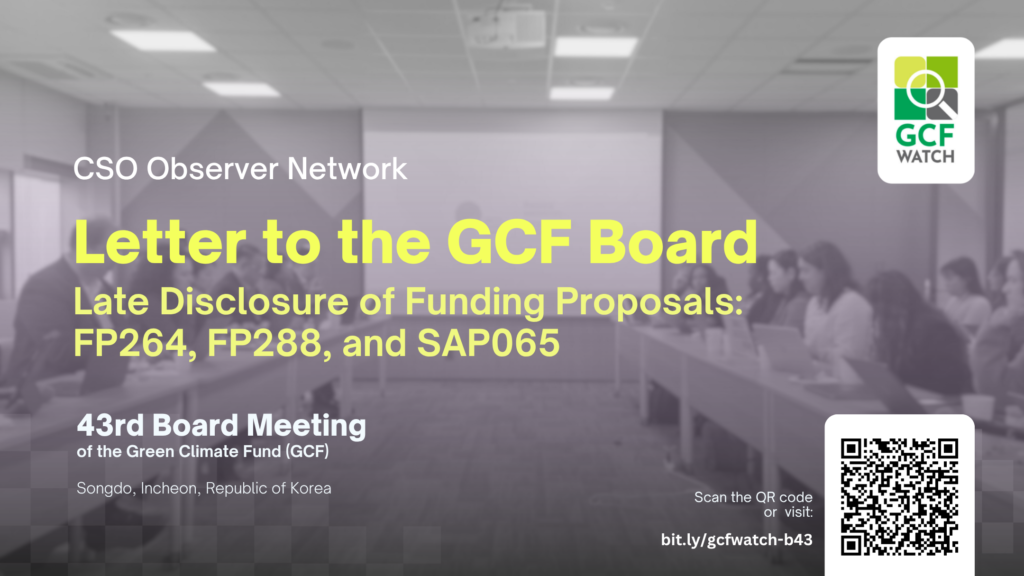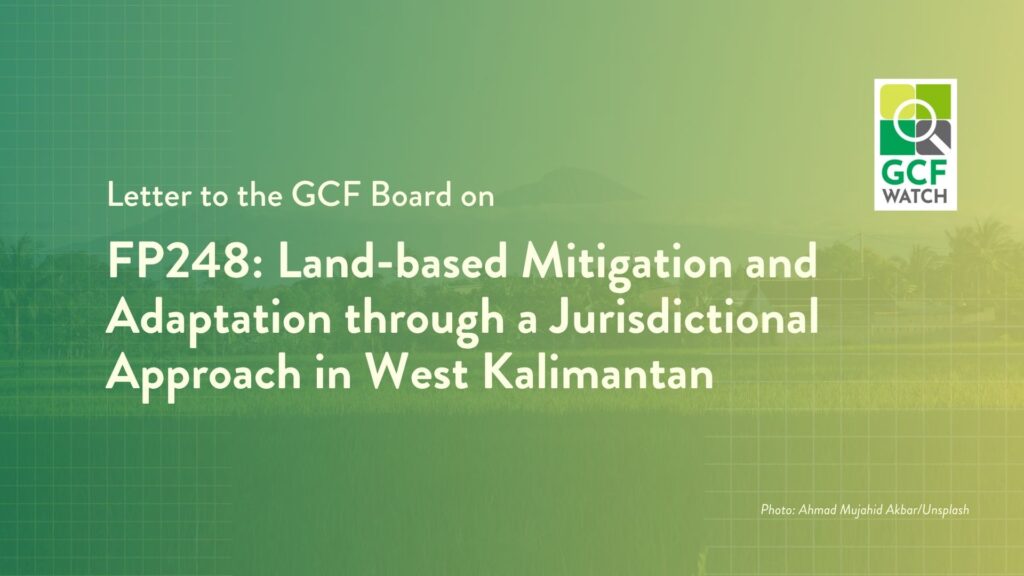CSO Updates on the 30th Board Meeting of the Green Climate Fund – Day 1
DAY 1 – 4 October 2021
Note: You may also download the report here.
The 30th Board Meeting of the Green Climate Fund is scheduled to run virtually from 4 to 7 October, 2021. The Board is expected to deliberate on the approval of 13 Funding Proposals amounting to USD 1.2 billion and the re-accreditation of 4 Accredited Entities, as well as address several governance issues and close policy gaps, among others.
The start of the meeting was rather slower than previous BMs as Day 1 was spent mostly on various procedural matters. As soon as the co-chair from Mexico proceeded with the Opening of the Meeting and welcomed the new members of the Board and their alternates, a number of procedural objections were already raised by developing country BMs. BMs from Egypt and Saudi Arabia reminded the co-chairs to abide by what is in the Rules of the Procedure, particularly when there are objections raised to decisions made in between meetings. Without giving much details, both BMs believe there is no space in the current agenda to address this matter and they want to hear how the co-chairs intend to resolve the objections before proceeding with the rest of the agenda for B30.
The co-chair from Mexico argued that a written response, to which he considers as the “co-chairs ruling” has been circulated already as a response to the objections raised. He asked the objecting BMs to refer to the said ruling, to which BM from Egypt sought the secretariat’s advice if the co-chair’s ruling is enough to address the objection. The GCF Legal Counsel on behalf of the secretariat responded by saying the said co-chairs ruling falls short of a definitive ruling. The Legal Counsel then proposed that the Board proceed with a voting procedure so they can decide whether the co-chairs ruling was satisfactory enough for the objections raised. This prompted the BM from Egypt to request for a temporary suspension to consult with other BMs about the best way forward.
When the session resumed, BM from Egypt proposed a statement to be adopted by the Board. The statement reads that the co-chairs ruling made in response to an objection for a decision made in between meetings (B29 and B30) should not set a precedent for future decisions. This received no objections and comments from other Board Members and was fully recognized by both co-chairs.
More procedural issues were raised when the Board went on with the Adoption of the Agenda, where a long discussion about the African Group’s objection took place. BM from South Africa shared that the group is against the proposed sequencing of the B30 agenda items and that the co-chairs should have provided space to deal with the functions of the Independent Evaluation Unit first before other policy items. He reminded the Board that the evaluations made by the IEU should be used to help the Board make informed decisions that ultimately leads to enhancing the overall performance of the GCF. According to him, the Technical Sessions held a week before B30 on the Simplified Approval Process (SAP) and Climate Rationale were done without taking into consideration relevant evaluations made by the IEU. He added that the African Group has made several requests since B28 to discuss evaluation matters, but the co-chairs seem to have not understood the value of prioritizing it over other agenda items.
The co-chair responded by saying that the independent evaluation of SAP and Climate Rationale are already part of the proposed agenda, under agenda 9a and 17b respectively. However, the BM from South Africa insists there is a need to add a separate agenda item that will clarify the purpose and function of the independent evaluations. Other BMs have no objection to this proposal. BMs from Canada, UK and Egypt just reiterated the need to move quickly as there are a number of items that the Board needs to resolve at this Board Meeting.
After several back and forths, the co-chair agreed to add another agenda item to discuss matters related to evaluation functions, as suggested by the African Group. It will be discussed after the Board adopts the revised agenda and will follow the discussion on the Work Programme and Budgets of the Independent Units for 2022.
The Co-Chairs then gave the floor to the heads of the independent units – Independent Redress Mechanism (IRM), Independent Integrity Unit (IIU) and the Independent Evalutaion Unit (IEU), to present their work plan and budget for 2022.
The total budget for 2022 proposed by the IRM is USD 1.64 billion with significant increases in allocation to full time staff and shared costs’ allocation, particularly to augment their communications work. The IRM head also noted that the budget for travel, consultancies, and operation costs have gone down due to the virtual set-up and mentioned that there is only a very gradual budget increase since 2017. The IRM’s budget utilization for 2021 is also above 80%.
As for the Independent Integrity Unit (IIU), a total budget of USD 2.7 billion for 2022 was proposed. They also reported that they received 5 new cases in 2021, two of which pertained to staff misconduct, and three related to GCF projects. The unit also reported an overall decrease in reported cases compared to the previous year. The IIU also added that their initiative in 2021 centered on pivoting towards mitigation, preventive initiatives, and proactive integrity reviews.
The Independent Evaluation Unit (IEU), which proposed a budget of USD 6.5 billion, reported a 9.7% increase from their 2021 budget. At present the IEU is preparing for the major evaluation as part of the GCF’s Second Performance Review (SPR). They also identified plans for capacity building, strengthening evaluation standards, conducting global evidence reviews on gendered impacts and behavioral interventions, and making three independent consultants to assume full time staff positions.
The Board had a number of reactions to the budget and workplans presented. In general, many expressed support to IRM’s work with the BM from Egypt encouraging the IRM to hire a new communications expert for the purpose of reaching out to all AEs and informing them about the existence of the IRM and what it can provide.
The BM from Switzerland asked about the IIU’s proposed study on GCF work culture to identify remedial measures for the internal grievance mechanism. Given the reported decrease in cases, the BM asked if it was still necessary to conduct the survey, to which the IIU responded by stating that they will continue to track the progress to give better recommendations in the future. The Executive Director of the Secretariat also asserted that they will continue to conduct surveys on workplace culture and sources of concern.
As for the IEU, many developed country BMs raised concerns over the timeline and scheduled reporting of the Second Performance Review (SPR) of the GCF. They argued that the IEU should present the SPR earlier (or in November 2021) so that the Board could better be informed for the GCF’s 2nd Replenishment. The IEU then responded that the proposed timeline was based on past experiences and consultations with staff members in programming and replenishment. The IEU also cited the several instances of failing to meet original timelines in large evaluations also due to staff limitations.
The BM from Argentina also encouraged the IEU to conduct more line and field activities to produce better informed evaluations, to which the IEU responded that they are making every effort to stay in touch with realities on the ground.
Due to pending issues with the proposed work plan of the IEU, the co-chair from France decided to suspend the item. He asked the IEU to conduct offline consultations with the Board Members regarding these issues, and then took note that the 2022 budget and work plans of both the IRM and IIU are already approved by the Board.
The Board then proceeded to the newly added agenda item, Matters Related to Evaluation Functions. As this was raised by the BM from South Africa during the adoption of the agenda, a proposed decision text was already drafted and circulated among Board members
In the draft decision, the Board had a discussion, as joined by the GCF General Counsel, on paragraphs B and E. BMs from Germany and UK pointed out that the language is ambiguous and leaves many ways for interpretations.
Paragraph B pertains to the consideration of the Independent Evaluation of the Simplified Approval Process Pilot (SAP) which is to be discussed at this Board Meeting. It reads that the matter is an exceptional agenda item that is why it is being deliberated by the Board, and such deliberation shall not set a precedent for deliberations of other evaluations. The BM from Sweden suggested deleting Paragraph B beecause SAP evaluation is like any other evaluation and should be treated as equally important for the Board’s discussion at a Board Meeting. The BM from Germany proposed a middle ground by amending Paragraph B, and proposed a direction on how the Board will approach future evaluations for its discussions and considerations. These are said in light of the remarks by the Co-Chair from Mexico that there shall be a standard procedure on how the Board will approach future evaluations for its discussions and considerations, which was the Co-Chair’s own interpretation of the proposed decision text.
Paragraph E pertains to the instructions of the Board to the IEU regarding formulating a draft decision text based Board consultations regarding several evaluations tabled at this Board Meeting. The BM from Sweden also suggested deleting this paragraph and argued that Board efforts should further be directed towards resolving policy gaps instead of complicating the process of discussing and considering evaluations. The General Counsel of the GCF clarified that adopting the said decision proposed, as written, is not a binary yes-or-no adoption, and the consideration of the enumerated evaluation will still be subject to Board approval.
The BM from Sweden also suggested sticking with the proposed deadline of comments and consultations which was originally set at November 30, 2021. However, the BM from South Africa suggested setting the deadline to a further date–January 20, 2022, to give more time for BMs and Alternate BMs to study the evaluations and submit their comments.
No resolution was reached by the Board despite the time extension and the Co-Chair from Mexico placed the agenda item for further discussion and offline consultations.
Day 1 of B30 ended 9 minutes past the scheduled end of day.
You can catch the recordings and live stream of the proceedings of the Board at:
https://www.greenclimate.fund/
Note: You may also download the report here.









